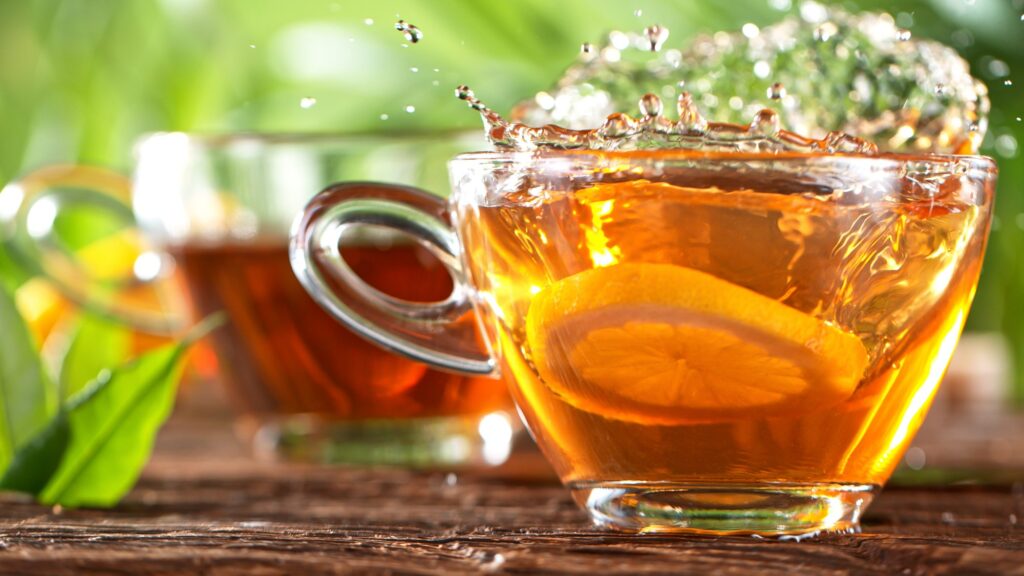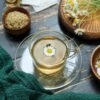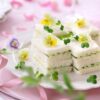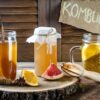
Did you know that black tea is the most widely consumed type of tea globally? Whether you’re a tea enthusiast or simply enjoy a good cuppa, understanding the caffeine content and health impact of black tea is essential.
What is black tea?
Black tea is a type of tea that is more oxidized than green, white, and oolong teas. It is known for its robust flavor and dark color, making it a popular choice for tea drinkers around the world. Black tea is made from the leaves of the Camellia sinensis plant and undergoes a process called oxidation, which gives it its unique characteristics.
During oxidation, the tea leaves are exposed to air, which causes them to darken and develop a rich flavor profile. This process also affects the caffeine content of black tea, as the oxidation can break down some of the caffeine molecules present in the leaves.
Caffeine in black tea
Contrary to popular belief, black tea actually contains less caffeine than coffee. On average, an 8-ounce cup of black tea contains around 30-60 milligrams of caffeine, while a cup of coffee can contain anywhere from 95-200 milligrams. However, it’s important to note that the actual caffeine content can vary depending on various factors.
The caffeine in black tea is a natural stimulant that can provide a temporary energy boost and increase alertness. It works by blocking adenosine receptors in the brain, which helps to promote wakefulness. However, it’s worth mentioning that the effects of caffeine can vary from person to person, and some individuals may be more sensitive to its effects than others.
The effects of caffeine on the body
Caffeine affects the body in several ways. When consumed, it is quickly absorbed into the bloodstream and travels to the brain. There, it blocks the action of adenosine, a neurotransmitter that promotes relaxation and sleepiness. As a result, caffeine can increase alertness and improve cognitive performance.
In addition to its stimulant effects, caffeine can also increase heart rate and blood pressure. This is why it’s important to consume caffeine in moderation, as excessive intake can lead to unwanted side effects such as jitters, anxiety, and even heart palpitations. It’s also worth noting that caffeine is a diuretic, which means it can increase urine production and potentially contribute to dehydration if consumed in large quantities.
Health benefits of black tea
Black tea is not just a flavorful beverage; it also offers a variety of potential health benefits. It is rich in antioxidants called polyphenols, which have been shown to have anti-inflammatory and antioxidant properties. These antioxidants can help protect the body against damage from free radicals, which are unstable molecules that can contribute to chronic diseases.
Some studies have suggested that black tea consumption may be associated with a reduced risk of heart disease, stroke, and certain types of cancer. The polyphenols in black tea may help improve blood vessel function, reduce cholesterol levels, and inhibit the growth of cancer cells. However, more research is needed to fully understand the extent of these benefits and how they vary among individuals.
How much caffeine is in black tea compared to other beverages?
When it comes to caffeine content, black tea falls somewhere in the middle compared to other popular beverages. As mentioned earlier, an 8-ounce cup of black tea typically contains around 30-60 milligrams of caffeine. In comparison, an 8-ounce cup of coffee can contain anywhere from 95-200 milligrams of caffeine, while a can of cola has around 30-50 milligrams.
It’s important to keep in mind that these are average values, and the actual caffeine content can vary depending on factors such as brewing time, tea quality, and individual differences. Brewing black tea for a longer period or using more tea leaves can result in a higher caffeine content, while shorter brewing times or using fewer leaves can result in lower caffeine levels.
Factors that can affect the caffeine content in black tea
Several factors can influence the caffeine content in black tea. One of the most significant factors is the brewing time. The longer you steep the tea, the more caffeine will be extracted from the leaves. If you prefer a stronger cup of tea, you may end up consuming more caffeine. On the other hand, if you prefer a milder flavor and shorter brewing time, the caffeine content will be lower.
The quality of the tea leaves can also impact the caffeine content. Higher-quality tea leaves tend to have a higher caffeine content compared to lower-quality leaves. This is because the younger leaves, which are often used in higher-quality teas, contain more caffeine.
Additionally, the water temperature used for brewing can affect the caffeine content. Steeping tea in hotter water can result in a higher caffeine extraction compared to brewing in cooler water. Therefore, it’s important to find the brewing method and temperature that suits your preferences and caffeine tolerance.
Is black tea a healthy choice for caffeine-sensitive individuals?
If you’re sensitive to caffeine or trying to reduce your intake, black tea can still be enjoyed in moderation. Its lower caffeine content compared to coffee makes it a suitable alternative for those looking for a milder stimulant effect.
However, it’s important to listen to your body and pay attention to how you personally react to caffeine. If you find that even small amounts of caffeine disrupt your sleep, cause anxiety, or lead to other unwanted side effects, it may be best to limit or avoid black tea altogether.
The impact of caffeine on sleep quality
Caffeine can have a significant impact on sleep quality, especially if consumed later in the day. It can interfere with the body’s natural sleep-wake cycle by delaying the onset of sleep and reducing overall sleep duration. This is why it’s generally recommended to avoid consuming caffeine at least six hours before bedtime.
If you’re someone who enjoys a cup of black tea in the evening, opting for decaffeinated black tea can be a suitable alternative. Decaffeinated black tea has undergone a process to remove most of the caffeine content while retaining the flavor and other beneficial compounds found in regular black tea.
Tips for enjoying black tea without experiencing negative effects
To enjoy black tea without experiencing negative effects, there are a few strategies you can try:
- Limit your intake: Moderation is key when it comes to caffeine consumption. Consider reducing the number of cups of black tea you drink each day or opting for smaller servings.
- Pay attention to brewing time: Shortening the brewing time can result in a milder cup of tea with lower caffeine levels. Experiment with different brewing times to find what works best for you.
- Try decaffeinated options: If you’re sensitive to caffeine or prefer to avoid it altogether, decaffeinated black tea is a great alternative. It offers the same flavor profile without the stimulant effects.
- Be mindful of other sources of caffeine: Remember that black tea is not the only source of caffeine in your diet. Be mindful of other beverages and foods that may contain caffeine, such as coffee, chocolate, energy drinks, and certain medications.
The role of black tea in a balanced and healthy lifestyle
Black tea, with its rich flavor and potential health benefits, can be a part of a balanced and healthy lifestyle. While it contains less caffeine than coffee, it still provides a moderate boost of energy and can be enjoyed in moderation by most individuals.
Understanding the factors that influence the caffeine content in black tea, as well as being aware of your own caffeine sensitivity, can help you make informed decisions about your tea drinking habits. Whether you prefer a stronger cup of tea or a milder brew, there are options available to suit your preferences and caffeine tolerance.
So go ahead, pour yourself a cup of black tea, and savor the surprising truth about its caffeine content and impact on your health. Cheers to a delightful tea-drinking experience that adds a touch of wellness to your day!






